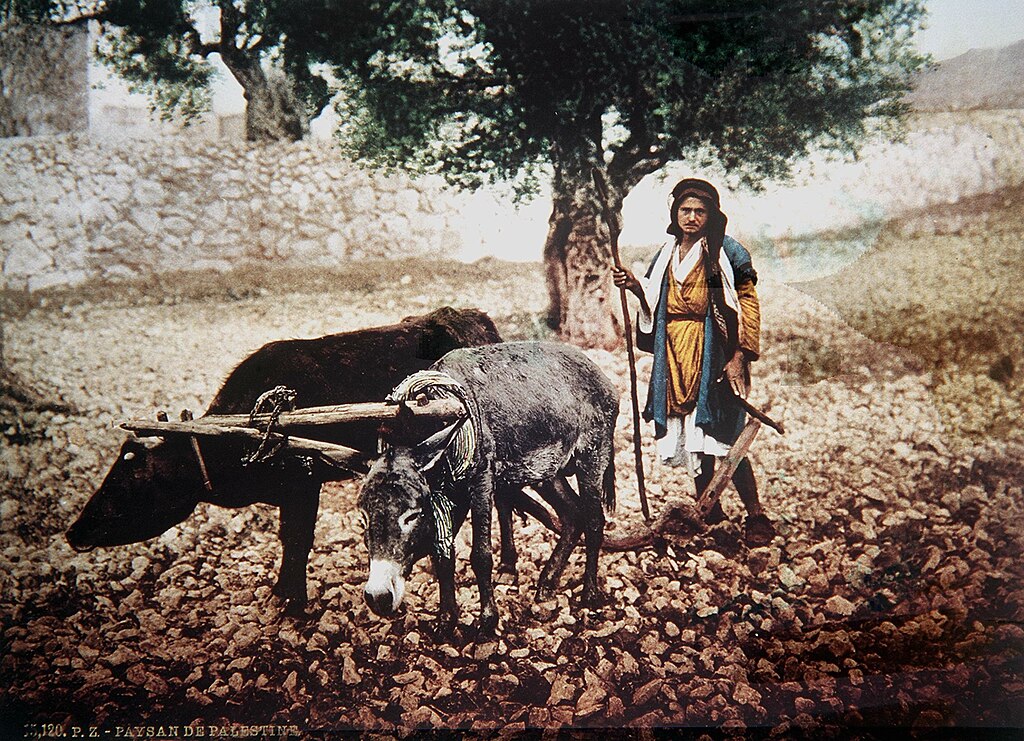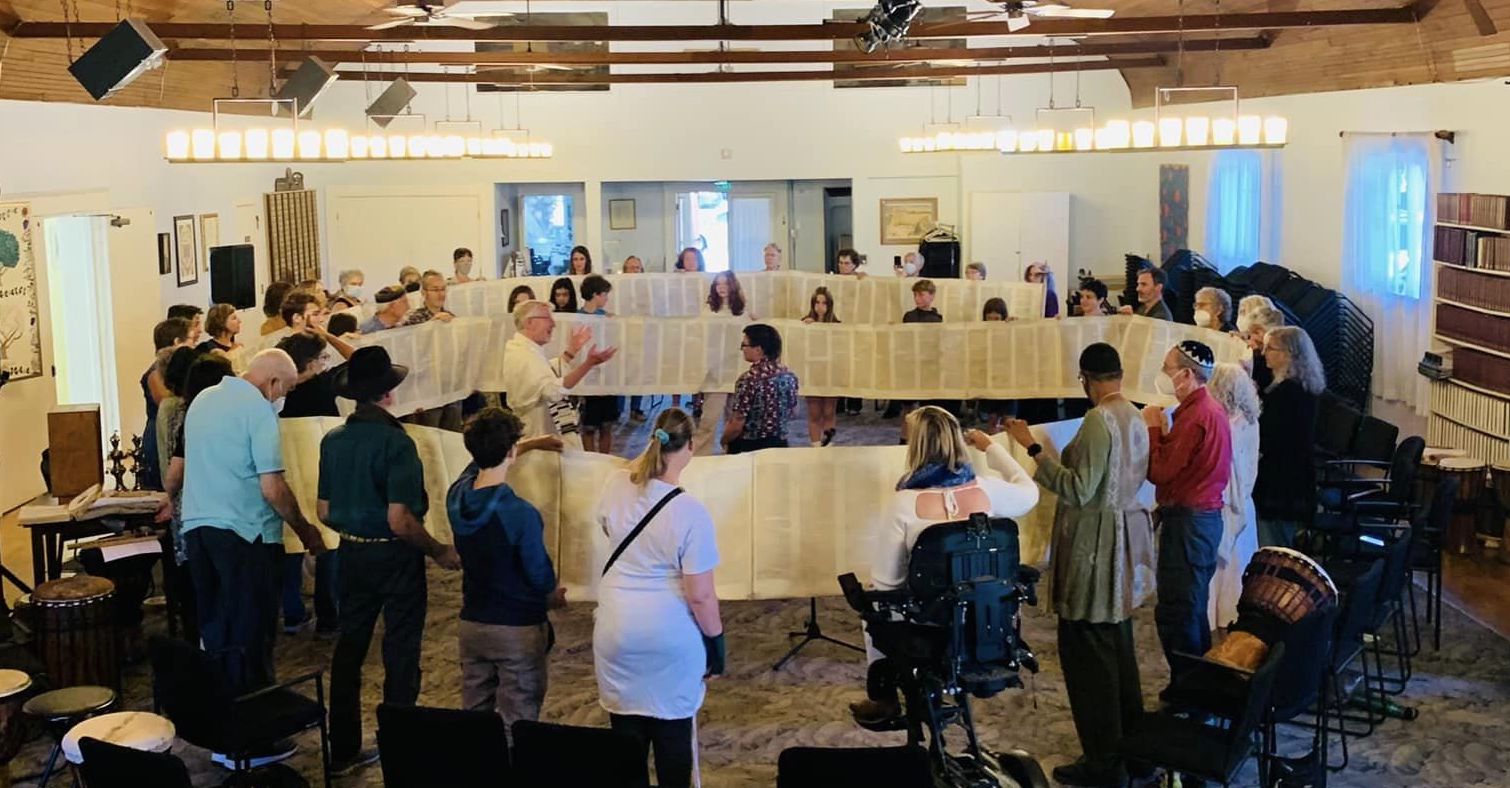Drash for Congregation Ner Shalom‘s Shabbat service, October 13, 2023, a few days after the start of the Israel-Gaza war.
by Cyndi Norwitz.
A few days ago, we celebrated Simchat Torah, marking the cycle of our sacred book from the end all the way forward to the beginning. We unrolled the Torah scroll, creating a circle of holy words around us. Then we rolled it back up again to start our year afresh.
Tonight, we begin the first Torah portion of the year: Bereshit. It’s a long parashah, running from the creation of the universe all the way through to Noah. Now you might have heard a story about Noah and a boat. But that’s for next week.
This week Noah breaks a curse. Which curse you might ask? There are so many in Bereshit. Eve is cursed. The snake from the Garden of Eden is cursed. But this one is the curse of Adam.
To Adam [God] said, “Because you did as your wife said and ate of the tree about which I commanded you, ‘You shall not eat of it,’
Cursed be the ground because of you;
By hard labor shall you eat of it
All the days of your life:Thorns and thistles shall it sprout for you.
But your food shall be the grasses of the field;By the sweat of your brow
Genesis 3:17-19
Shall you get bread to eat,
Until you return to the ground—
For from it you were taken.
For dust you are,
And to dust you shall return.”
There’s a bit of history here. When humans became self-aware, they expanded to geographies where nourishment required more than reaching into a tree for fruit and grubs. They invented agriculture and cooking and—in Biblical lands at least—the staple of their diet was bread.
After spending months researching the process for my novel, I can tell you, breadmaking is a task that envelopes a community. Breaking the soil, sowing, tending, reaping the grain. Then threshing, dehulling, and grinding. All that only gives you flour. You then have to build and maintain ovens, find sources of fuel, create your leaven, mix, proof, knead, shape, and bake the loaves. Only in community can we eat bread.

The commentators speak of different elements of the curse. One is about agricultural tools. Some say Noah was the innovator of the plow and other tools and that, before he came, humans got grain from the grasses of the field using their hands.
The second is the thorns and thistles. While Rashi and others interpret this to mean ancient Hebrews were eating artichokes and cardoon, I suspect the line has more to do with the grain itself. Ancient forms of wheat had a sharp and spiky extra covering, one that had to be removed in an extra step of dehulling (whereas modern wheat only needs to be threshed).
Most important though is the line from the curse: All the days of your life. Because this was not a curse for all time, but a curse only for Adam’s lifetime. All humans suffered from his curse, but only for one generation. Granted, the supernatural 930 years of Adam’s life made for a very long generation. But the curse died with him. In Torah, the first person born after Adam’s death is his descendent Noah.
So much can happen in a single generation. At Simchat Torah last Sunday, Rabbi Irwin Keller pointed out a bit of Torah that even the sofers could not help illuminating. In the story of Jacob and his brother Esau, we have twin brothers who hated each other. Jacob tricked Esau out of his birthright and their father’s blessing and Esau nearly murdered Jacob for it. They went their separate ways for 25 years—one normal human generation—before seeing each other again.
What would their reunion bring? Frozen hearts? Pillage? Death? Instead of all that, it brought kisses. They fell upon each other in love. Neither forgot the fear and loss, but their brotherhood was more powerful than their years of wrongdoings.
In Torah, the nations surrounding the Israelites are mostly descended from siblings who went their separate ways: Esau, Cain, Jabal, Ham, Japheth, and of course Ishmael. To live in peace it takes more than getting along. It’s about seeing all others as equals deserving of everything we want for ourselves.
Today, as we end a week of war that follows decades of oppression, let us take the opportunity to start a new cycle. On this Sabbath eve, the first of our Biblical year, may we see our siblings’ pain. May we feel the anguish that leads people to unconscionable choices. May we start the difficult work of sitting down together to break our bread.



0 responses so far ↓
There are no comments yet...Kick things off by filling out the form below.
Leave a Comment